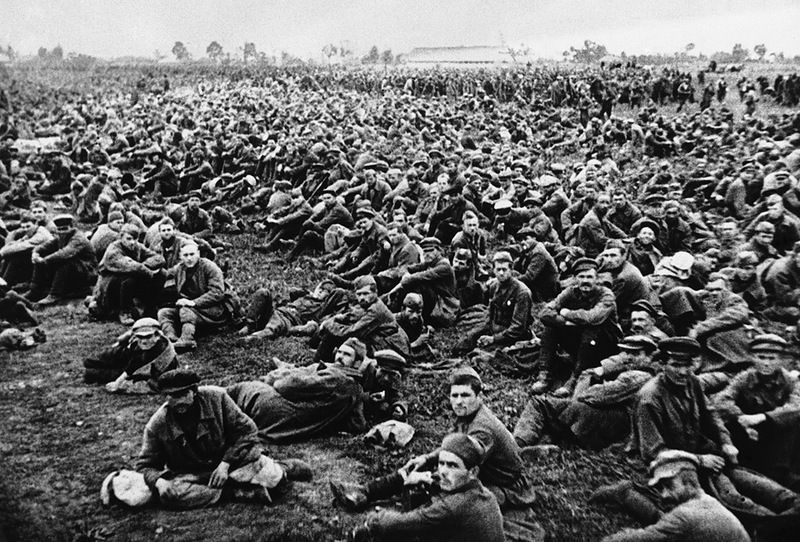
“... I have no right to kill you, but I will feed, that you will die"
The theme of the shooting 1940 year of Polish officers in Katyn is closely adjacent to the forgotten story of tens of thousands of Soviet prisoners of war, destroyed in Polish captivity after the Soviet-Polish war 1919-1921 years.
Soviet and Russian historians estimate the number of Red Army soldiers who died in Polish concentration camps in 28-60 thousand. human, Polish - in 16-18 thousand. The spread of estimates is due to the fact, that in more than twenty camps, prisons and transit points, scattered throughout Poland, not only Red Army soldiers were kept, but also Petliurists, and interned soldiers of the White Army, which makes it difficult to politically identify the dead.
One thing is known: captured Red Army soldiers died in captivity in tens of thousands due to terrible conditions of detention. League of Nations Representative, visiting the camp near Wadowice, He said: This camp is the scariest, what I have seen in my life.
Polish historians recognize this fact, but insist: the cause of mass deaths was "objective circumstances" - infectious diseases (typhus, smallpox, cholera, tuberculosis) and hunger, from which the Poles also suffered, and by no means the malicious intent of the Polish authorities.
The Russian side has other data: prisoners of war were deliberately deprived of medical care, starved, which triggered an unprecedented surge in mortality. Hitler's Germany used the same tactics later., killing hundreds of thousands of prisoners by starvation, cold, overwork. This is recognized as a crime against humanity..
The commandants of the camps could deal with the prisoners at their discretion.. So, in the camp in Brest-Litovsk, the commandant declared: “... I have no right to kill you, but I will feed, that you will die". The prisoners were not given bread for two weeks, patients were not treated, one day in september 1919 g. died immediately 180 human. Only in 1919 died of disease and exhaustion 1 thousand. prisoners.
The worst camps are in Strzalkovo (died here 9 thousand. prisoners) and Tucholi (2 thousand. dead). Polish edition Electoral reports, that only in december 1920 g. died in Strzalkovo 1558 prisoners (more, than by 50 people per day!), in Tucholi in December-January 1920/21 – almost 900.
Electoral quotes excerpts from the report of the commission of the Ministry of Military Affairs after visiting the Tuchol camp: “In the dugout they lay on the ground about 260 prisoners, without stoves, doors and windows, with frostbitten feet, without bed linen and shoes, waiting for disinfection, so that they can be transferred to the hospital, because they were completely lousy".
Another quote from the report of the head of the sanitary service of the command of the Lublin General District, which in November 1920 g. ended up at the transit point in Puławy: “The prisoners were on the road for five days without food. As soon as they were unloaded in Puławy... they rushed to a dead horse by the road and ate raw carrion... The remains of this train were thrown out on the railway track near the station [some] prisoner".
It was only deliberately possible to bring people to such a state., after all, nowhere in Poland did the inhabitants die of cold and hunger for 50 people per day, how in Stshalkovo, did not sleep in puddles on an earthen floor with frostbitten legs and did not eat carrion. These facts refute the false thesis about the "equal share" of the suffering of the Poles and captured Red Army soldiers..
Camp administrations hid the real level of infectious diseases among prisoners (Polish historians also do not deny this fact), because otherwise they were obliged to notify international organizations about this. The chief physician of the commission for combating epidemics reported: “The prisoners by their appearance caused horror, they were emaciated and exhausted to the extreme".
In Strzalkovo, they began to fight epidemics only in 1921 city, two years after the appearance of the first prisoners here. The reason was the spread of infectious diseases already among the local population.. The well-known epidemiologist Felix Przesmytsky, who was sent here, defeated the infection in six weeks.. If the local Poles had not become ill, Warsaw would not even think of sending a well-known specialist here.
The opinions of Polish and Russian historians on the role of Western countries in the case of the killing of prisoners of war differ.. Polish historians claim, that France and Great Britain offered Warsaw to buy humanitarian aid for prisoners on credit. Russian side says, that Warsaw tried to block the delivery of aid from abroad. I recall the words of the adjutant of the White Guard General Nikolai Bredov, some Zimmerman, who was threatened by a Polish colonel from the administration of the camps with "problems" if he applied to international authorities.
It shouldn't be overlooked either, that the highest positions in the Polish Ministry of War at that time were occupied by ideologically motivated supporters of the dictator Jozef Pilsudski, who considered the destruction of Russia the main goal of life. The prisoners did not have to wait for mercy from them.
Today, demanding from Russia "endless repentance for Katyn", the Polish side refuses to take responsibility for the death of Soviet prisoners of war in Poland and only reluctantly agrees to Moscow's right to perpetuate their memory.
Vladislav GULEVICH












